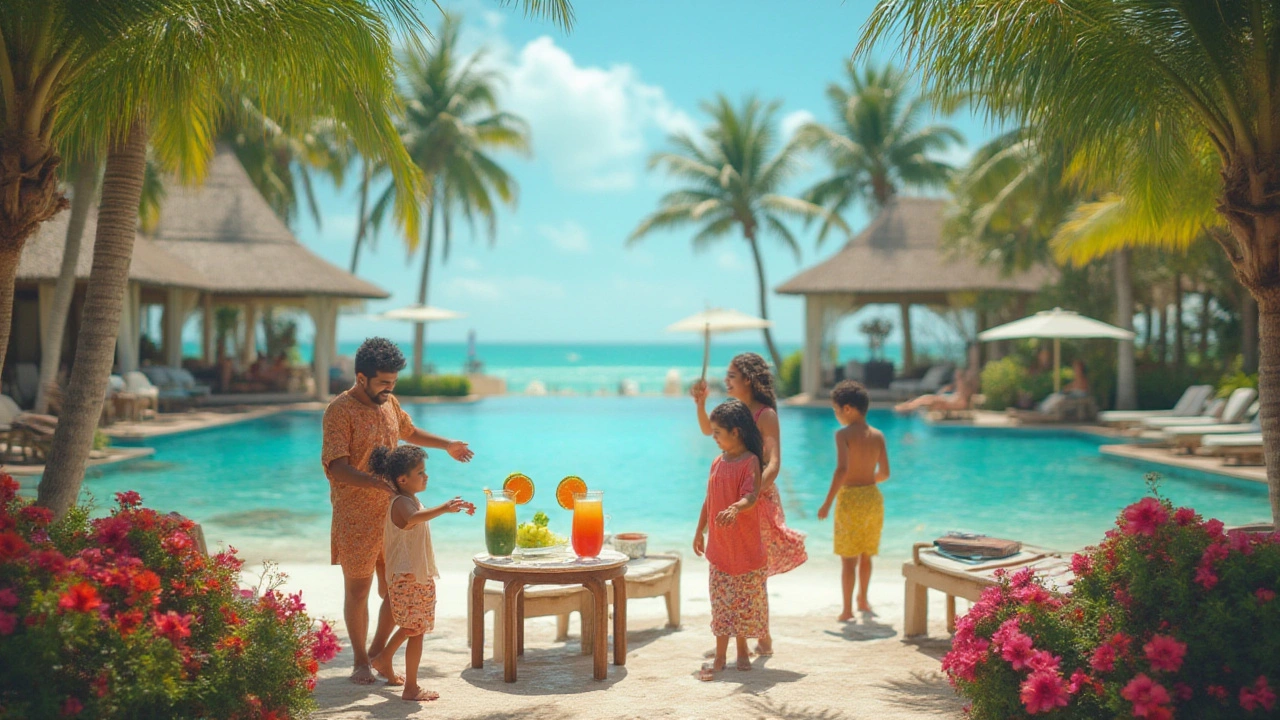Bargain holidays are overrated if you end up eating chips from a paper bag under a leaky beach umbrella. The real move? Snagging an all-inclusive resort that feels like a fantasy come true just from stepping off the plane. Think endless food, death-defying pools, cocktails on tap, zero stress about surprise bills, and someone else making your bed. But let’s not kid ourselves: not all all-inclusives deliver on that dream. And the last thing you want is a banging hangover from buyer’s remorse. The trick? Knowing exactly what to look for—and what to dodge—so your hard-earned cash buys pure, sun-drenched relaxation.
Why Location Is Everything (and Not Just for the Weather)
People get starry-eyed over resort brochures showing turquoise water, but “paradise” can hide next to a sewage plant or hours from anything worth seeing. Here’s what I always tell friends: don’t just look at the country—zoom in. Which coast? What’s nearby? Some of the best resorts are set on private beaches with instant access to clean water, good snorkelling, and local markets, so you’re not trapped behind fences with the same old pool every day.
Distance from airports matters. If your flight lands late or you’re travelling with kids, a 3-hour shuttle is nobody’s idea of fun. In Mexico’s Riviera Maya, for example, the difference between staying in Playa del Carmen and Tulum could mean nearly double the transfer time. Check flight times and distance—Google Maps is your friend. Safety is also a must, especially for solo travellers or families. Go beyond the resort’s website: look up forums and recent local news. And don’t ignore the region’s climate or seasons: the Maldives look stunning, but monsoon season will have you swapping that sunset dinner for soggy room service. Try to balance eye-candy views with practicality. Some Caribbean spots are known for sargassum seaweed invasions at certain times of year, which can really shake up your beach days. Always read up on the latest.
Also, think about what you want nearby. In Jamaica, for example, Montego Bay is the life of the party, while Negril is dreamy and mellow—less nightlife, more peaceful strolls on the sand. Resorts in isolated areas can sound romantic, but if you like exploring off-resort, food tours, or nightlife, check for towns or attractions within a taxi ride. No one wants to pay top euro for a five-star prison. In Europe, Greek islands have all-inclusives steps from historic towns, while in Turkey or Croatia, you’ll find beachfront options where locals actually go for dinner. Location shapes every bit of your stay.
Sorting the Real Deals From the Gimmicks: What’s Actually Included?
This is where it gets tricky, because every resort throws around the term “all-inclusive,” but it means wildly different things—the devil is in the details. Let’s break down what most resorts cover, and where to pay extra attention.
Start by reading the fine print on meals and drinks. “All meals” sometimes means you’ll eat at the buffet all week, but pay a premium for à la carte steak or sushi nights. Alcohol might come with caveats—local beer and spirits could be free, but cocktails or international brands add up on your bill. What about snacks? Fancy a poolside pizza or afternoon ice cream? In some places, you’re only covered during ‘meal times.’
Activities matter, too. Are water sports or snorkelling gear included, or will you pay hourly? Some Caribbean resorts throw in paddleboards, kayaks, and even scuba lessons, while others charge for everything but the sand. Evening entertainment, kids’ clubs, and fitness classes are perks in some resorts, basic in others where you’ll shell out for water aerobics or Zumba. Don’t be shy—email the resort and ask exactly what’s covered.
WiFi can be a surprise. Reliable, free WiFi should be standard, but plenty of places charge a daily fee—or the free connection only works in the lobby. Airport transfers? Sometimes included; sometimes a pricy extra. Always check if gratuities and taxes are rolled into the rate. A sneaky service charge at checkout can ruin the afterglow of a perfect holiday. And spa access? Most resorts charge for treatments, but some let you use saunas and pools for free. A good rule: if it’s not spelled out, assume it’s not included.
Look for packages that fit your type of travel. Some resorts design stays around couples (think private dinners, adults-only pools, bubbly breakfasts), while others are built for families with waterparks, babysitting, and game rooms. Reading direct reviews from people like you—solo, groups of friends, families—will show how well these extras really work.

Spotting Quality: Reading Between the Reviews
Every resort has glossy photos and glowing blurbs. But how do you spot the places that deliver? Simple: real traveller reviews, ideally from people there in the last six months. Go for detail in the reviews, not just the star rating. Was the food fresh, repetitive, or surprisingly different every day? Did the staff go out of their way, or ignore special requests? Were the pools and rooms really as clean as promised, or was there a cockroach cameo?
Sites like TripAdvisor, Booking.com, and Google Reviews are great, especially when you filter by most recent. Reading a single rave or rant won’t tell you much, but a pattern of issues—or praise—tells the story. Watch for reviews from people like you: families, couples, solo travellers, or groups.
One overlooked detail: how management responds. A sharp resort manager will jump into negative reviews and show they actually fix problems. If there’s a complaint about food, see if management explains changes or apologizes. If reviews talk about long check-in delays or “missing” activities, this might be a recurring issue. Photos from guests (not just the official ones) reveal the truth about the rooms, the pool, the gym, or the beach. You’ll see if that infinity pool really has a view or just looks onto the car park. When reviews clash—some claiming “paradise,” others warning “run!”—see if it lines up with personal preferences; maybe “loud entertainment” is a turnoff, or “relaxed” is code for “boring.”
Don’t skip niche forums or Facebook groups for travellers to your chosen region. You’ll find threads like “what I wish I knew before booking”—real, off-the-cuff advice about the best rooms, which blocks to avoid (get the one with the best sunrise view), or how to snag last-minute deals. Fact: some resorts reward guests who mention positive reviews with upgrades or perks—take note.
The Perks That Set the Best All-Inclusive Resorts Apart
Little extras turn a “good” place into “I’m going back every year.” What perks should you check for before locking in your booking? Personalization is big: things like welcome drinks, room selection (view, pool access, adult-only wing), birthday or anniversary surprises, and even pillow menus. Premium all-inclusives sometimes include butler service, laundry, or bespoke excursions you won’t find elsewhere.
Dining variety is huge. Resorts with loads of à la carte restaurants make each night feel special. Some have street-food-inspired stalls, vegan menus, or farm-to-table dinners. Michelin-starred chefs? Yes, a real thing in a few Caribbean and Mediterranean properties. All-inclusives in places like Mauritius, Crete, or the Dominican Republic are upping the food game to beat the “mass buffet” image. If you want more than just “burger and chips”, check the fine print for food choices.
Family extras—think kid-safe pools, splash parks, babysitting, or supervised camps—take the stress off parents. For adults, spa credits, cocktail-making classes, or yoga on the beach are becoming standard. Don’t overlook the vibe: some all-inclusives now focus on wellness, so you’ll find pilates, cold plunge pools, and even sleep-focused amenities.
Eco-friendly credentials matter more these days. The standout resorts handle waste responsibly, protect local wildlife, and employ local staff instead of importing workers. Look for third-party certifications if that’s important to you. Fast fact: some places in the Caribbean and Maldives are now coral gardeners, offering guests a chance to help plant new reefs—an unreal memory, and good for your conscience. If sustainability is part of your checklist, search for “Green Globe” or “Travelife” certified resorts.
Finally, some resorts score loyalty points for repeat guests, offer last-minute booking bonuses, or seasonal events you won’t find anywhere else. Joining the resort’s mailing list can net you sneaky discounts or a room a notch above the one you booked.

Booking Strategy: Best Times to Book and Common Pitfalls
Once you’ve found that dream resort, booking smart saves you money and stress. Direct through the resort? Third-party site? Each has perks. Booking direct often comes with extra perks—room upgrades, resort credit, late checkouts—but third-party operators sometimes bundle flights, insurance, and airport transfers at a steeper discount. Don’t just look at the headline price: check cancellation policies. In 2020 and 2021, thousands of people learned the hard way that “non-refundable” deals can turn into real problems if you have to change plans. Flexible bookings are worth a little extra if you want peace of mind.
Timing matters. Some of the best deals for all-inclusives come in the shoulder seasons, just before or after peak months. For the Mediterranean, early June and late September are goldmines: prices are lower, crowds are thinner, and the weather still delivers. In the Caribbean, May and October are often the sweet spot, just avoid hurricane weeks. The Maldives and Seychelles have different peak seasons, so double-check destination-specific trends. And yes, booking far in advance can snag deals—especially for popular family resorts during school holidays—but last-minute deals exist if you’re flexible on room style or don’t mind shorter stays.
Don’t mess around with hidden fees. Some resorts love to slip in extra charges—for premium drinks, child care, watersports, luggage storage, or “resort fees” that seem pointless. Always screenshot your booking terms, and check your bank statements for anything unexpected. Watch for “upgrade traps”—where rooms are deliberately overbooked, and you’re pressured into a pricier suite upon arrival. It’s not as rare as you’d think.
Last tip: don’t forget travel insurance. Even the slickest resort can’t control a flight cancellation or sudden illness. The peace of mind is worth it every single time. And if you’re heading somewhere new, check if you need vaccinations or special travel documents. Certain island destinations still have entry rules, especially after recent global events.
So, on your next search for the all-inclusive resort of your dreams, remember: location, details, honest reviews, extras, and how—plus when—you book make all the difference between a ‘just fine’ holiday and an absolute stunner you’ll be raving about for months. Chase it smart, and you’ll land somewhere you actually don’t want to leave.
